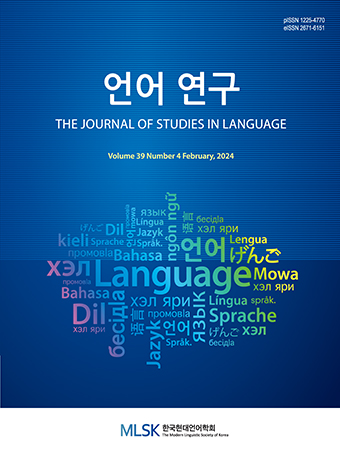Research Article
Abstract
References
Information
There are plenty of culture-bound words, phrases and utterances in a person’s language that is difficult (or almost impossible) to presuppose and accommodate, for the reason that they are unique only to the speakers of that particular language (i.e., not universally shared across languages and cultures). Therefore, the current study aims to shed light on cultural presuppositions, and on how accommodation takes place between languages. This study hopes to identify culture-specific presuppositions found in English and Filipino, discuss and elaborate the adjustments done by the participants in accommodating cultural presuppositions. Moreover, this study gives emphasis to the significance of the hearer’s willingness to accept the speaker’s cultural beliefs, background, values and systems without creating a fuss—or defying it—in order to build a common cultural ground and successfully accommodate cultural presuppositions. (Chungnam National University)
- Alex, 2010, 2016. Magdalena. Urban Dictionary. Retrieved from http://www.urbandictionary.com/define.php?term= Magdalena.
- Anonymous, 2014. My husband has another woman. Buhay OFW. Retrieved from http://www.buhayofw.com/legal-advice /family-law/tanong-ko-lang-po-yung-asawa-ko-po-ay-may-babae-ofw-po-sya-at-umuwi-sy-5436e6ca5e4ba.
- Bond, M. and Yang, K. 1982. Ethnic Affirmation versus Cross-cultural Accommodation. Journal of Cross-Cultural Psychology 13, 169-185.10.1177/0022002182013002003
- Constitution of the Philippines, 1987. The Constitution of the Republic of the Philippines. Retrieved from http://www.gov.ph/constitutions/1987-constitution.
- Cunniff, K., Gustafson, J. and Ralston, D. 1995. Cultural Accommodation: The Effect of Language on the Responses of Bilingual Hong Kong Chinese Managers. Journal of Cross Cultural Psychology, 26, 2-3.
- Duranti, A. 1997. Linguistic Anthropology. Cambridge: Cambridge University Press, 46-50.10.1017/CBO9780511810190
- Epatko, L. 2011. In South Korea, the Importance of ‘Wellbeing.’ PBS Newshour. Retrieved from https://abudira.files. wordpress.com/2012/01/pragmatics__oxford_introductions_to_language_study__2.pdf.
- Gonzales, A. 1987. Poetic Imperialism or Indigenous Creativity? Philippine Literature in English. In Larry E. Smith (ed.). Discourse Across Cultures. London: Prentice Hall, 141-155.
- Gudykunst, W. 1994. Bridging Differences: Effective Intergroup Communication. Sage 27.
- Levinson, S. 1983. Pragmatics. Cambridge: Cambridge University Press, 181-184.10.1017/CBO9780511813313
- Lo, S. 2008. Crab Bucket. Urban Dictionary. Retrieved from http://www.urbandictionary.com/define.php?term= Crab%20bucket.
- Nida, E. and Reyburn, W. 1981. Meaning Across Cultures. New York: Orbis Books, pp. 14-16.
- Ping, K. 1999. Cultural Presuppositions and Misreadings. Meta: Translators’ Journal, 44, 133-143.
- Stalnaker, R. 1970. Pragmatics. Synthese 22(1-2).10.1007/BF00413603
- Stalnaker, R. 1973. Presuppositions. Journal of Philosophical Logic 2, 447-457.10.1007/BF00262951
- Stalnaker, R. 1974. Pragmatic Presuppositions. In Milton Munitz and Peter Unger (eds.), Semantics and philosophy. New York: New York University Press, 197-213.
- Stalnaker, R. 1978. Assertion. In Peter Cole (ed.), Syntax and Semantics. New York: Academic Press, 315-322.
- Stalnaker, R. 1998. On the Representation of Context. Journal of Logic, Language and Information 7.
- Stalnaker, R. 1999. Context and Content. Oxford: Oxford University Press, 46-61. 10.1093/0198237073.001.0001
- Stalnaker, R. 2002. Common Ground. Linguistics and Philosophy, 25 (5-6), 701-721.10.1023/A:1020867916902
- Strevens, P. 1987. Cultural Barriers to Language Learning. In L. E. Smith (ed.), Discourse Across Cultures. Strategies in World Englishes. London: Prentice Hall, 169-178.PMC1255297
- Smith, L. 1987. Introduction: Discourse Strategies and Cross-cultural Communication. In L. E. Smith (ed.). London: Prentice Hall International, 169-178.
- T.AlwaysB4U, 2008. My woman. Urban Dictionary. Retrieved from http://www.urbandictionary.com/define.php? term=My%20Woman.
- Thomason, R. 1990. Accommodation, Meaning, and Implicature: Interdisciplinary Foundations for Pragmatics. In Philip Cohen, Jerry Morgan and Martha Pollack (eds.), Intentions in Communication. Cambridge, MA: MIT Press, 325-363.
- Tylor, E. 1871. Primitive Culture: Researches Into the Development of Mythology, Philosophy, Religion, Language, Art, and Custom. Cambridge: Cambridge University Press, 1-2.
- Ungerer, F. and Schmid, H. 2013. An Introduction to Cognitive Linguistics (2nd ed.). London: Routledge, 51-52. 10.4324/9781315835396
- van der Sandt, R. 1992. Presupposition Projection as Anaphora Resolution. Journal of Semantics 9.10.1093/jos/9.4.333
- von Fintel, K. 2000. What is Presupposition Accommodation? Cambridge, MA: MIT Press.
- von Fintel, K. 2008. What is Presupposition Accommodation, Again? Philosophical Perspectives 22.1, 137-170.10.1111/j.1520-8583.2008.00144.x
- White, L. 1975. The Concept of Cultural Systems. Columbia: Columbia University Press, 3-10.PMC1859307
- Publisher :The Modern Linguistic Society of Korea
- Publisher(Ko) :한국현대언어학회
- Journal Title :The Journal of Studies in Language
- Journal Title(Ko) :언어연구
- Volume : 34
- No :3
- Pages :457-473
- DOI :https://doi.org/10.18627/jslg.34.3.201811.457




 The Journal of Studies in Language
The Journal of Studies in Language






